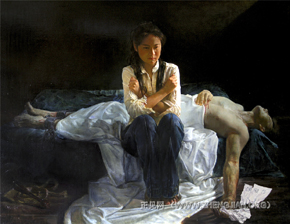 |
The first thing the audience will see is a dead young man and a beautiful young woman mourning his death. The artist tries to reveal the Chinese Communist Party’s (CCP) appallingly cruel persecution that the CCP has been hiding from most of the world at all costs. The goal of the CCP’s ruthless persecution is to either force Falun Gong practitioners to renounce Falun Gong by torture or torture them to death to stop them from practising Falun Gong. The painting also shows that Falun Gong practitioners are enduring the most insufferable pain physically and spiritually in order to safeguard their belief, truth and justice. They will not compromise their cultivation principles of Truth, Compassion and Forbearance even if it costs them their lives. Through this painting, the artist is making a heartbreaking call for help to uphold justice for Falun Gong practitioners and to restore the people’s conscience.
This is a tragic death of a Falun Gong practitioner who has been subjected to many inhuman tortures. There is an ambient level of sadness and pain in the painting. The use of dark colour palettes created a feeling of suppression. The artist used a cross in the composition, which creates a solemn and grave feeling and accentuates the severity and the serious of the subject. These techniques deliver not only the mental torment of the young woman in silent tears, but also a creepy, haunting atmosphere of horror in the CCP’s persecution.
We can see that the author impresses the tragic death upon the audience by portraying the inner world of the young woman instead of the dead man. The young woman, instead of the dead victim, is the centre of the painting. She is the main character that touches the heart of the audience. The artist sent out a meaningful and timeless message. He has expressed the immortal spirit of all the Falun Gong practitioners who have refused to compromise their faith despite tortures or even murder.
The young woman is obviously tormented by her husband’s tragic death. The way she embraces herself and her silent tears deliver a contagious feeling of sadness.
The pair of wedding bands on their fingers hints at the relationship between the young woman and the young man. The young woman’s metallic watch and jeans hint that this is a modern tragedy. The half-hidden button of Falun Gong’s symbol indicates that she too is a Falun Gong practitioner. While she supports her husband’s uncompromising spirit, she has to endure his tragic death, as well as the persecution she, too, faces. In reality, the CCP would never agree to let her see her husband before he died. Hence, we can conclude that the artist incorporates different space-time dimensions in this painting. This young mourning wife sitting next to her husband may be a symbol that her spirit is with her husband.
The careful and delicate design of the young woman’s presence has revealed the artist’s ingenuity and artistic talents. Every little detail about this woman carries a special meaning.
Now let’s turn our attention to the dead young man wearing foot shackles and has red marks on his ankles. The foot shackles imply that he had been subjected to cruel torture in prison before he died. The red marks are a symbol of the CCP, which has attempted to force the man to give in to its red terror. The young man has a torn piece of paper in his left hand with three large Chinese characters that mean “Forced Brainwashing Centre.” It implies that the young man had resisted the CCP’s forced brainwashing, a type of mental torture, before he died. The artist successfully illustrated that the evil and cruel CCP is trying to reign in China with terror and that the courageous young man will not give in to the CCP’s terror.
This painting illustrates that a truly great masterpiece is very rich in meanings and far beyond a reenactment of the terror, blood and gore in reality. By looking at this seemingly simple portrait, we can imagine the sad stories behind the portrait. Every small detail in the painting leads the audience to imagine the horrible and thuggish nature of the CCP and its henchmen. The audience can easily imagine that the young couple’s human rights must have been severely violated and that they must have suffered a most unbearable level of physical and mental torture in China.
The woman’s tears are a silent accusation against her husband’s murderers. It is the artist’s way to call for justice and to awaken people’s consciences.
* * *
You are welcome to print and circulate all articles published on Clearharmony and their content, but please quote the source.










 more ...
more ...